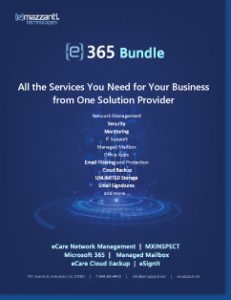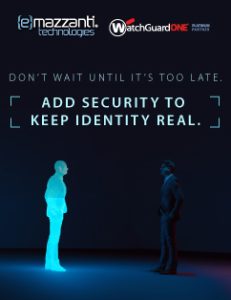|
Getting a Handle on E-Mail Storage
 E-mail has become so ingrained in the way your company does business that you probably can’t imagine working without it. However, for all its convenience, e-mail can also be a problem. As the daily barrage of messages passes back and forth, in-boxes get clogged, and before you know it, you’re facing a storage problem. Luckily, there are many ways to solve that problem — and not all of them involve spending thousands of dollars on technology. Here are some tips on finding the right solution for you. E-mail has become so ingrained in the way your company does business that you probably can’t imagine working without it. However, for all its convenience, e-mail can also be a problem. As the daily barrage of messages passes back and forth, in-boxes get clogged, and before you know it, you’re facing a storage problem. Luckily, there are many ways to solve that problem — and not all of them involve spending thousands of dollars on technology. Here are some tips on finding the right solution for you.
Stop Problems Before They Start | To address the issue of e-mail storage, you must first determine how your employees manage their individual e-mail accounts. Are they hanging on to every message they receive because they’re afraid to delete anything? If you don’t have a formal records-retention policy that spells out how long messages should be kept before being discarded, it’s time to create one. If you use a commercial e-mail program, such as Microsoft Exchange, you can set it to automatically delete all e-mail older than a certain time period — for example, 30, 60 or 90 days — to guarantee compliance. (Employees can protect important messages from deletion by moving them out of the main mailbox and into personal, or .pst, folders.)
Another way to ease e-mail storage is by using filters to manage mail. With these tools, employees can filter incoming messages by type — for example, bulk mail can be sent directly to a folder for automatic deletion, or messages from a particular address can be flagged for immediate follow-up. When combined with automated cleanup, this will solve many immediate e-mail storage problems. If important messages are dealt with quickly and unimportant messages are filtered out and deleted, there will be much less clutter sitting around in your employees’ in-boxes and clogging up your e-mail server. You’ll also get the added benefit of increased efficiency and better customer service.
Store on a Small Scale | Even if your employees are filtering and purging their e-mail regularly, they may still find they need extra space to save messages for business reasons. The problem can often be handled simply and cost-effectively by instructing employees to archive e-mails in .pst files on CD or DVD media. It’s possible to store a great deal of data this way, and all you’ll need to invest in is a supply of discs, along with a few external CD or DVD burners if your employees’ computers don’t have them built in.
Bring Out the Big Guns | So you’ve done everything you can to maximize your current storage, and you’re still coming up short? In this case, it may be time to consider purchasing a full-fledged storage system. (This is also your best bet if you are required to save copies of e-mail communications for legal reasons, as many companies in the financial, legal and healthcare industries are.)
It’s a big investment, but don’t panic — options are available to ensure that you get the right solution for your business. If you only need to move e-mail off your main server to free up space, you can install a software program that creates a “stub file” — a marker that points to the actual e-mail — for each archived message. Clicking on the stub file calls the message up from storage, which may be on a separate server or an online storage system.
If you’re subject to information-storage regulations, your situation is a bit different. In this case, you must save an actual second copy of each legally protected message, using a read-only format that prevents it from being altered.
You also must have the ability to create an audit trail that shows where the message was forwarded, who received it, and how they responded. Finally, you must store the message in a way that allows you or your employees to quickly retrieve it if necessary.
To meet all these requirements, you’ll need a true database software solution that supports indexing and content searches, as well as a dedicated server with a reliable backup system. While many businesses rely on tape media for backup, it’s not the best choice for archiving e-mail: if a regulatory agency suddenly requests copies of communications relating to a particular topic, you won’t have time to hunt through endless tapes in search of a particular e-mail. Instead, consider a disk-based archive system, which combines many hard disks to provide fast backup and retrieval; a network-attached storage system; or a storage area network (a separate network dedicated specifically to data storage).
Whatever your e-mail storage issues may be, we’re ready and willing to help you overcome them. As a VentureTech Network solution provider, we have access to the latest hardware and software products and the technical expertise to turn them into the right solution for you. Contact us at any time to schedule a consultation.
|


 E-mail has become so ingrained in the way your company does business that you probably can’t imagine working without it. However, for all its convenience, e-mail can also be a problem. As the daily barrage of messages passes back and forth, in-boxes get clogged, and before you know it, you’re facing a storage problem. Luckily, there are many ways to solve that problem — and not all of them involve spending thousands of dollars on technology. Here are some tips on finding the right solution for you.
E-mail has become so ingrained in the way your company does business that you probably can’t imagine working without it. However, for all its convenience, e-mail can also be a problem. As the daily barrage of messages passes back and forth, in-boxes get clogged, and before you know it, you’re facing a storage problem. Luckily, there are many ways to solve that problem — and not all of them involve spending thousands of dollars on technology. Here are some tips on finding the right solution for you.










